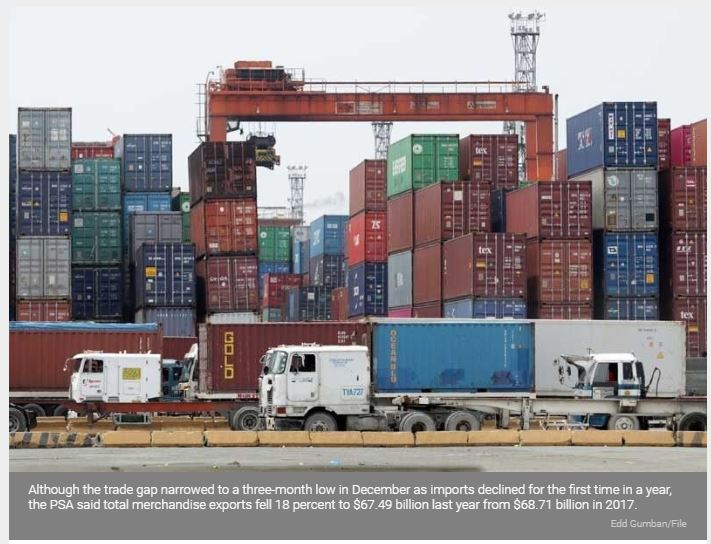Philippines: Trade deficit widens to record $41 billion in 2018
MANILA, Philippines — The country’s trade balance deteriorated to a record-high deficit of $41.44 billion last year as imports rose sharply while exports waned down, the Philippine Statistics Authority (PSA) reported yesterday.
Although the trade gap narrowed to a three-month low in December as imports declined for the first time in a year, the PSA said total merchandise exports fell 18 percent to $67.49 billion last year from $68.71 billion in 2017.
In December alone, the trade deficit further narrowed to $3.75 billion from $3.9 billion in November 2018 and the all-time high $4.081 billion registered in October 2018.
This as exports fell 12.3 percent year-on-year to $4.72 billion in
December 2018 from $5.38 billion in the same month a year earlier due to the sharp declines in outbound shipments of machinery and transport equipment, coconut oil, electronic products and other manufactured goods.
Imports, meanwhile, fell to $8.47 billion, lower by 9.4 percent year-on-year from $9.36 billion in December 2017.
The slowdown in imports for the first time in a year were caused by declines in the inbound shipments of raw materials and intermediate goods, as well as capital goods which are used as inputs in industrial output.
Imports of consumer goods likewise fell steeply by 12.1 percent in December 2018.
These goods are broadly classified as transport equipment; miscellaneous manufactured articles; mineral fuels, telecommunication equipment and electrical machinery, food and love animals, and electronic products.
The National Economic and Development Authority (NEDA) attributed the weakness in the December 2018 trade data to regional uncertainties brought about by the weakening of the Chinese economy and the US-China trade tension.
“Merchandise trade in all the monitored Asian economies continued to weaken in the last month of 2018 as the region began to feel the impact of the weakening Chinese economy and the US-China trade tension,” said Socioeconomic Planning Secretary Ernesto Pernia.
As policy uncertainty remains a threat to global trade, Pernia said the government should continue to work on legislative reforms that would open up sectors to foreign investment.
These include the proposed amendments to the Foreign Investment, Retail Trade, and Public Services Acts.
“We should encourage foreign firms to transfer their manufacturing facilities in the Philippines and to take advantage of the growing domestic market,” said Pernia.
The full implementation of the Ease of Doing Business and Efficient Government Service Act of 2018 should also be pushed to eliminate bureaucratic and regulatory barriers that raise the cost of doing business in the country, he said.
Meanwhile, the umbrella organization of exporters in the country is hopeful of seeing a six percent growth in outbound merchandise shipments this year to reverse last year’s decline.
“We are hoping this year, we can have better performance than last year. We hope to see six percent growth,” Philippine Exporters Confederation Inc. president Sergio Ortiz-Luis Jr. said in a telephone interview yesterday.
For the month of December alone the country’s export sales were valued at $4.72 billion last year, 12.3 percent lower than the $5.38 billion in the same month in 2017.
Trade Secretary Ramon Lopez said the Philippines along with other Asian economies suffered from an export decline in December due to softening demand on the back of global growth slowdown, as well as increased uncertainty with the escalating US-China trade tensions.
“Electronics supply chain in the region was adversely affected as lower orders from one country can lead to lower orders in other supplier countries,” he said.
He said non-electronic exports, meanwhile, were affected by production capacity issues.
In particular, he said chemical products were mainly affected by ports and logistics efficiency issues in their import-export operations, as well as police security and control procedures on chemicals trade.
Exports performance of agricultural products such as coconut and mango are affected by supply and prices issues, while processed food exports faced high cost and supply issues in sugar inputs.
Ortiz-Luis said the group’s projection for the year is based on expectations of improvement in agriculture supply, as well as lower shipping costs.
This, as he said the government is taking steps to promote improved supply of agricultural products and to lower shipping costs.
A joint administrative order covering rules and regulations on fees and charges of shipping lines, port operators, truckers, and port users for reduced operating costs and improved logistics efficiencies is set to be issued this month by government agencies Department of Trade and Industry, Department of Finance, Department of Transportation, Bureau of Customs, Bureau of Internal Revenue, Maritime Industry Authority, Philippine Ports Authority, and the Subic Bay Metropolitan Authority. – with Louella Desiderio
Source: https://www.philstar.com/business/2019/02/13/1893146/trade-deficit-widens-record-41-billion-2018#DpP3EI2MDjWR0PDf.99


 Thailand
Thailand




